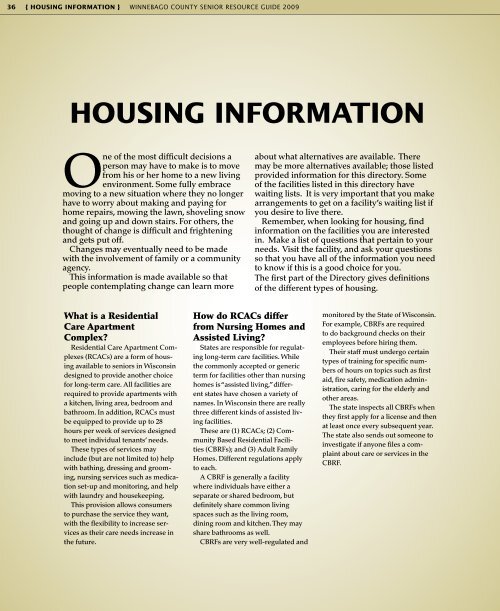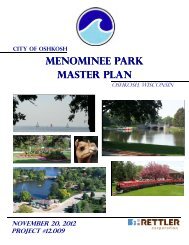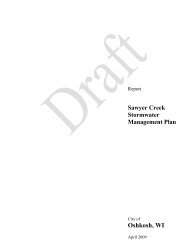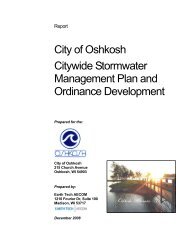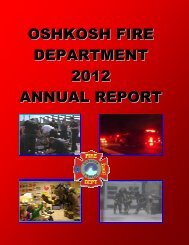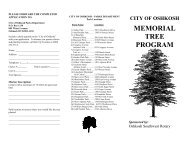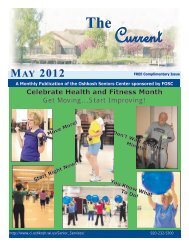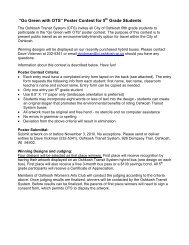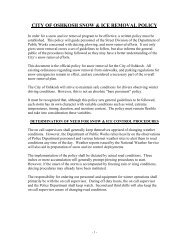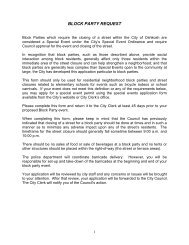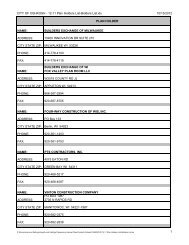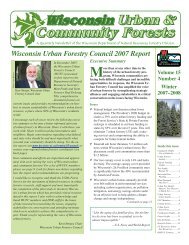WiNNEBaGO COUNTy SENiOR RESOURCE ... - City of Oshkosh
WiNNEBaGO COUNTy SENiOR RESOURCE ... - City of Oshkosh
WiNNEBaGO COUNTy SENiOR RESOURCE ... - City of Oshkosh
You also want an ePaper? Increase the reach of your titles
YUMPU automatically turns print PDFs into web optimized ePapers that Google loves.
36 { HOUSING INFORMATION } WINNEBAGO COUNTY SENIOR <strong>RESOURCE</strong> GUIDE 2009<br />
Housing Information<br />
One <strong>of</strong> the most difficult decisions a<br />
person may have to make is to move<br />
from his or her home to a new living<br />
environment. Some fully embrace<br />
moving to a new situation where they no longer<br />
have to worry about making and paying for<br />
home repairs, mowing the lawn, shoveling snow<br />
and going up and down stairs. For others, the<br />
thought <strong>of</strong> change is difficult and frightening<br />
and gets put <strong>of</strong>f.<br />
Changes may eventually need to be made<br />
with the involvement <strong>of</strong> family or a community<br />
agency.<br />
This information is made available so that<br />
people contemplating change can learn more<br />
about what alternatives are available. There<br />
may be more alternatives available; those listed<br />
provided information for this directory. Some<br />
<strong>of</strong> the facilities listed in this directory have<br />
waiting lists. It is very important that you make<br />
arrangements to get on a facility’s waiting list if<br />
you desire to live there.<br />
Remember, when looking for housing, find<br />
information on the facilities you are interested<br />
in. Make a list <strong>of</strong> questions that pertain to your<br />
needs. Visit the facility, and ask your questions<br />
so that you have all <strong>of</strong> the information you need<br />
to know if this is a good choice for you.<br />
The first part <strong>of</strong> the Directory gives definitions<br />
<strong>of</strong> the different types <strong>of</strong> housing.<br />
What is a Residential<br />
Care Apartment<br />
Complex?<br />
Residential Care Apartment Complexes<br />
(RCACs) are a form <strong>of</strong> housing<br />
available to seniors in Wisconsin<br />
designed to provide another choice<br />
for long-term care. All facilities are<br />
required to provide apartments with<br />
a kitchen, living area, bedroom and<br />
bathroom. In addition, RCACs must<br />
be equipped to provide up to 28<br />
hours per week <strong>of</strong> services designed<br />
to meet individual tenants’ needs.<br />
These types <strong>of</strong> services may<br />
include (but are not limited to) help<br />
with bathing, dressing and grooming,<br />
nursing services such as medication<br />
set-up and monitoring, and help<br />
with laundry and housekeeping.<br />
This provision allows consumers<br />
to purchase the service they want,<br />
with the flexibility to increase services<br />
as their care needs increase in<br />
the future.<br />
How do RCACs differ<br />
from Nursing Homes and<br />
Assisted Living?<br />
States are responsible for regulating<br />
long-term care facilities. While<br />
the commonly accepted or generic<br />
term for facilities other than nursing<br />
homes is “assisted living,” different<br />
states have chosen a variety <strong>of</strong><br />
names. In Wisconsin there are really<br />
three different kinds <strong>of</strong> assisted living<br />
facilities.<br />
These are (1) RCACs; (2) Community<br />
Based Residential Facilities<br />
(CBRFs); and (3) Adult Family<br />
Homes. Different regulations apply<br />
to each.<br />
A CBRF is generally a facility<br />
where individuals have either a<br />
separate or shared bedroom, but<br />
definitely share common living<br />
spaces such as the living room,<br />
dining room and kitchen. They may<br />
share bathrooms as well.<br />
CBRFs are very well-regulated and<br />
monitored by the State <strong>of</strong> Wisconsin.<br />
For example, CBRFs are required<br />
to do background checks on their<br />
employees before hiring them.<br />
Their staff must undergo certain<br />
types <strong>of</strong> training for specific numbers<br />
<strong>of</strong> hours on topics such as first<br />
aid, fire safety, medication administration,<br />
caring for the elderly and<br />
other areas.<br />
The state inspects all CBRFs when<br />
they first apply for a license and then<br />
at least once every subsequent year.<br />
The state also sends out someone to<br />
investigate if anyone files a complaint<br />
about care or services in the<br />
CBRF.


